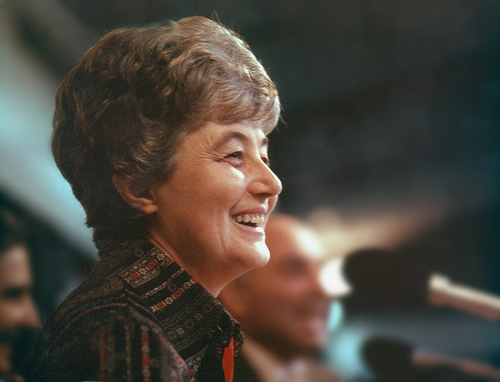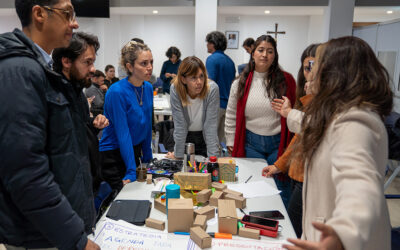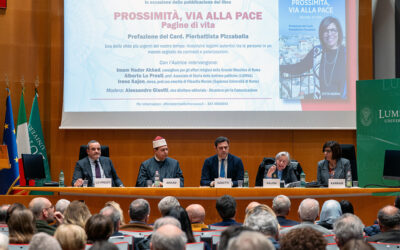 We must not cease praying for peace to return. … In this moment, we should all feel called to follow determinedly a life style which corrects, at least within us (and through the communion of saints in many others) the mistake that has been made. Human beings have not done the will of God, the will of the God of peace. They did their own will. We must do all we can, as never before, to carry out God’s will perfectly. “Not my will but yours be done”. Today these words of Jesus acquire an altogether special importance for us. Compared to His word, everything else must become secondary. We shouldn’t give much importance in our lives to being healthy or sick, to studying or serving, to sleeping or praying, to living or dying. What matters is to make his will our own, to be his will lived out. This is how we lived at the beginning of our Movement when, in the setting of another war, the Spirit gave us the light to understand the true value of things. Faced with the destruction caused by hatred, God revealed himself as the one ideal that does not pass, that no bomb could destroy. God Love. This was the great discovery, a spiritual bomb of such power that it made us literally forget all the bombs falling around us in the war. We discovered that above and beyond everyone and everything there is God who is love. There is his providence which makes all things work together for the good of those who love him. We discovered the signs of his love in each circumstance, even under the lash of suffering. He loved us immensely. How could we love him in return? “It is not the one who says Lord, Lord, who loves me, but the one who does my will.” We could love God by doing his will. Living like this we got used to listening ever more attentively to “the voice” within us, the voice of our conscience which emphasized the will of God expressed in different ways: through his Word, in the duties of our state in life, through circumstances and inspirations. We were certain that God would draw us into a divine adventure, at first unknown, where, as both spectators and actors in his design of love, we could give the contribution of our own free will, moment by moment. A short while later he let us perceive something of our future, helping us see clearly the purpose for which the Movement was coming about: to fulfill Jesus’ prayer in his testament, “Father, may they all be one”, working together to achieve a more united world. We can live like this now too. Have we experienced an abrupt and painful change? … Are we at times fearful and anguished, even wondering whether we are going to be killed? Or are we living life as usual, with all our daily tasks, far from any danger? For all of us what matters is what has most value: not one thing or another, but God’s will. Let’s seek to ‘listen’ putting his will in the first place in our heart, our memory, our mind. Let’s put, before all else, all our strength at his service. … In this way, Christ will remain in our hearts and we will be more together, more united, more ‘one’, sharing everything, praying powerfully for one another and for peace to return.”
We must not cease praying for peace to return. … In this moment, we should all feel called to follow determinedly a life style which corrects, at least within us (and through the communion of saints in many others) the mistake that has been made. Human beings have not done the will of God, the will of the God of peace. They did their own will. We must do all we can, as never before, to carry out God’s will perfectly. “Not my will but yours be done”. Today these words of Jesus acquire an altogether special importance for us. Compared to His word, everything else must become secondary. We shouldn’t give much importance in our lives to being healthy or sick, to studying or serving, to sleeping or praying, to living or dying. What matters is to make his will our own, to be his will lived out. This is how we lived at the beginning of our Movement when, in the setting of another war, the Spirit gave us the light to understand the true value of things. Faced with the destruction caused by hatred, God revealed himself as the one ideal that does not pass, that no bomb could destroy. God Love. This was the great discovery, a spiritual bomb of such power that it made us literally forget all the bombs falling around us in the war. We discovered that above and beyond everyone and everything there is God who is love. There is his providence which makes all things work together for the good of those who love him. We discovered the signs of his love in each circumstance, even under the lash of suffering. He loved us immensely. How could we love him in return? “It is not the one who says Lord, Lord, who loves me, but the one who does my will.” We could love God by doing his will. Living like this we got used to listening ever more attentively to “the voice” within us, the voice of our conscience which emphasized the will of God expressed in different ways: through his Word, in the duties of our state in life, through circumstances and inspirations. We were certain that God would draw us into a divine adventure, at first unknown, where, as both spectators and actors in his design of love, we could give the contribution of our own free will, moment by moment. A short while later he let us perceive something of our future, helping us see clearly the purpose for which the Movement was coming about: to fulfill Jesus’ prayer in his testament, “Father, may they all be one”, working together to achieve a more united world. We can live like this now too. Have we experienced an abrupt and painful change? … Are we at times fearful and anguished, even wondering whether we are going to be killed? Or are we living life as usual, with all our daily tasks, far from any danger? For all of us what matters is what has most value: not one thing or another, but God’s will. Let’s seek to ‘listen’ putting his will in the first place in our heart, our memory, our mind. Let’s put, before all else, all our strength at his service. … In this way, Christ will remain in our hearts and we will be more together, more united, more ‘one’, sharing everything, praying powerfully for one another and for peace to return.”
Be compassionate
Be compassionate




0 Comments